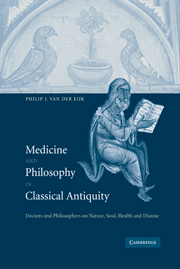 Medicine and Philosophy in Classical Antiquity
Medicine and Philosophy in Classical Antiquity Book contents
- Frontmatter
- Contents
- Acknowledgements
- Note on translations
- Note on abbreviations
- Introduction
- I HIPPOCRATIC CORPUS AND DIOCLES OF CARYSTUS
- 1 The ‘theology’ of the Hippocratic treatise On the Sacred Disease
- 2 Diocles and the Hippocratic writings on the method of dietetics and the limits of causal explanation
- 3 To help, or to do no harm. Principles and practices of therapeutics in the Hippocratic Corpus and in the work of Diocles of Carystus
- 4 The heart, the brain, the blood and the pneuma: Hippocrates, Diocles and Aristotle on the location of cognitive processes
- II ARISTOTLE AND HIS SCHOOL
- III LATE ANTIQUITY
- Bibliography
- Index of passages cited
- General index
1 - The ‘theology’ of the Hippocratic treatise On the Sacred Disease
Published online by Cambridge University Press: 22 September 2009
- Frontmatter
- Contents
- Acknowledgements
- Note on translations
- Note on abbreviations
- Introduction
- I HIPPOCRATIC CORPUS AND DIOCLES OF CARYSTUS
- 1 The ‘theology’ of the Hippocratic treatise On the Sacred Disease
- 2 Diocles and the Hippocratic writings on the method of dietetics and the limits of causal explanation
- 3 To help, or to do no harm. Principles and practices of therapeutics in the Hippocratic Corpus and in the work of Diocles of Carystus
- 4 The heart, the brain, the blood and the pneuma: Hippocrates, Diocles and Aristotle on the location of cognitive processes
- II ARISTOTLE AND HIS SCHOOL
- III LATE ANTIQUITY
- Bibliography
- Index of passages cited
- General index
Summary
Introduction
The author of the Hippocratic treatise On the Sacred Disease is renowned for his criticism of magical and superstitious conceptions and modes of treatment of epilepsy. He has been credited with attempting a ‘natural’ or ‘rational’ explanation of a disease which was generally believed to be of divine origin and to be curable only by means of apotropaeic ritual and other magical instruments. One interesting point is that he does not reject the divine character of the disease, but modifies the sense in which this disease (and, as a consequence of this conception, all diseases) may be regarded as divine: not in the sense that it is sent by a god, for example as a punishment, and is to be cured by this same god, but that it shares in the divine character of nature in showing a fixed pattern of cause and effect and in being subordinated to what may perhaps be called, somewhat anachronistically, a natural ‘law’ or regularity.
On the basis of these positive statements on the divine character of the disease various interpreters have tried to deduce the writer's ‘theology’ or religious beliefs, and to relate this to the development of Greek religious thought in the fifth century.
- Type
- Chapter
- Information
- Medicine and Philosophy in Classical AntiquityDoctors and Philosophers on Nature, Soul, Health and Disease, pp. 45 - 73Publisher: Cambridge University PressPrint publication year: 2005
- 9
- Cited by


